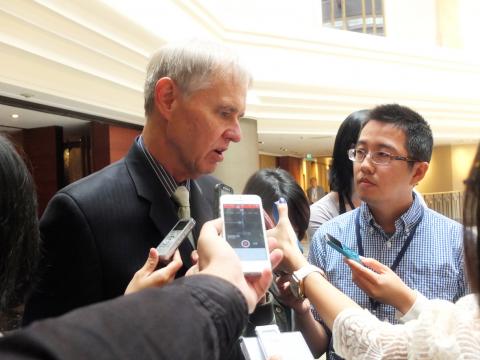Cross-strait relations need to enter a phase of incremental and reciprocal progression in which both sides of the Taiwan Strait build up mutual trust rather than Beijing’s unilateral and endless demands for President Tsai Ing-wen’s (蔡英文) administration to offer guarantees of its good will, said Richard Bush, director of the Center for Northeast Asian Policy Studies at the Brookings Institution think tank in Washington.
In an e-mail interview with the Chinese-language Liberty Times (the Taipei Times’ sister newspaper) on Tuesday, the former American Institute in Taiwan chairman said that after carefully reading the six-point statement issued by Chinese President Xi Jinping’s (習近平) government following his meeting with Chinese Nationalist Party (KMT) Chairwoman Hung Hsiu-chu (洪秀柱), it is clearly a statement of Beijing’s policy on cross-strait relations.
While Beijing maintains its stance that it requires the Tsai administration’s guarantee of good will, Taiwan has reason to mistrust Beijing’s intentions, he said.

Photo: Tsao Po-yen, Taipei Times
Xi’s “six-point statement” includes adherence to the so-called “1992 consensus” which reflected the “one China” principle; the adamant opposition to “pro-Taiwanese independence” separatists and their activities; the promotion of an increasingly integrated cross-strait economy and society; the joint promotion of Chinese culture; joint efforts to ensure the happiness of people on both sides of the Strait; and a joint effort to make the Chinese race great once more.
The “1992 consensus,” a term former Mainland Affairs Council chairman Su Chi (蘇起) admitted to making up in 2000, refers to a tacit understanding between the KMT and the Chinese government that both sides of the Taiwan Strait acknowledge there is “one China,” with each side having its own interpretation of what “China” means.
Xi’s comments on Hung’s proposal for a cross-strait peace accord is almost the same as the commentary heard under former Chinese president Jiang Zemin (江澤民) in the early 1990s to the early 2000s, Bush said, adding that had it not been for Hung specifically mentioning the issue, Xi would not have touched the subject.
Bush said he was puzzled as to why Hung would consider the Democratic Progressive Party’s independence platform to have potential danger, since Tsai seems to be focused on practical domestic policy problems.
He was unclear how the KMT’s new peace-centered policy platform could do more to stabilize cross-strait relations.
Bush also added that he did not understand how Hung could improve the KMT’s current predicament in Taiwan through interactions with China, as it could very well cause greater harm to the KMT as Beijing seems to be willing to pick a side when it comes to Taiwan’s internal politics.

Taiwan would welcome the return of Honduras as a diplomatic ally if its next president decides to make such a move, Minister of Foreign Affairs Lin Chia-lung (林佳龍) said yesterday. “Of course, we would welcome Honduras if they want to restore diplomatic ties with Taiwan after their elections,” Lin said at a meeting of the legislature’s Foreign Affairs and National Defense Committee, when asked to comment on statements made by two of the three Honduran presidential candidates during the presidential campaign in the Central American country. Taiwan is paying close attention to the region as a whole in the wake of a

President William Lai (賴清德) has appointed former vice president Chen Chien-jen (陳建仁) to attend the late Pope Francis’ funeral at the Vatican City on Saturday on his behalf, the Ministry of Foreign Affairs said today. The Holy See announced Francis’ funeral would take place on Saturday at 10am in St Peter’s Square. The ministry expressed condolences over Francis’ passing and said that Chen would represent Taiwan at the funeral and offer condolences in person. Taiwan and the Vatican have a long-standing and close diplomatic relationship, the ministry said. Both sides agreed to have Chen represent Taiwan at the funeral, given his Catholic identity and

Chinese Nationalist Party (KMT) Chairman Eric Chu (朱立倫), spokeswoman Yang Chih-yu (楊智伃) and Legislator Hsieh Lung-chieh (謝龍介) would be summoned by police for questioning for leading an illegal assembly on Thursday evening last week, Minister of the Interior Liu Shyh-fang (劉世芳) said today. The three KMT officials led an assembly outside the Taipei City Prosecutors’ Office, a restricted area where public assembly is not allowed, protesting the questioning of several KMT staff and searches of KMT headquarters and offices in a recall petition forgery case. Chu, Yang and Hsieh are all suspected of contravening the Assembly and Parade Act (集會遊行法) by holding

Lawmakers from the Democratic Progressive Party (DPP) yesterday established a friendship group with their counterparts in Ukraine to promote parliamentary exchanges between the two countries. A ceremony in Taipei for the Taiwan-Ukraine Parliamentary Friendship Association, initiated by DPP Legislator Chen Kuan-ting (陳冠廷), was attended by lawmakers and officials, including Deputy Minister of Foreign Affairs Francois Wu (吳志中) and European Economic and Trade Office in Taiwan Director Lutz Gullner. The increasingly dire situation in Ukraine is a global concern, and Taiwan cannot turn its back when the latter is in need of help, as the two countries share many common values and interests,